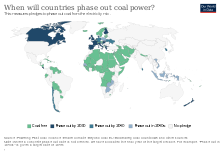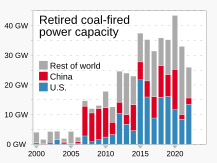
Back Ukončení spalování uhlí Czech Kohleausstieg German Wet verbod op kolen bij elektriciteitsproductie Dutch پړاو په پړاو د ډبرو سکرو استعمال ختمول Pashto/Pushto


Coal phase-out is an environmental policy intended to stop burning coal in coal-fired power plants and elsewhere, and is part of fossil fuel phase-out. Coal is the most carbon-intensive fossil fuel, therefore phasing it out is critical to limiting climate change as laid out in the Paris Climate Agreement.[4][5] The International Energy Agency (IEA) estimates that coal is responsible for over 30% of the global average temperature increase above pre-industrial levels.[6] Some countries in the Powering Past Coal Alliance have already stopped.[7]
China and India burn a lot of coal.[8] But the only significant funding for new plants is for coal power in China.[9] The health and environmental benefits of coal phase-out, such as limiting biodiversity loss and respiratory diseases, are greater than the cost.[10] Developed countries may part finance the phase out for developing countries through the Just Energy Transition Partnership, provided they do not build any more coal plants.[11] One major intergovernmental organisation (the G7) committed in 2021 to end support for coal-fired power stations within the year.[12] It has been estimated that coal phase-out could benefit society by over 1% of GDP each year to the end of the 21st century,[13] so economists have suggested a Coasean bargain in which developed countries help finance the coal phase-out of developing countries.[14]
In order to meet global climate goals and provide power to those that do not currently have it coal power must be reduced from nearly 10,000 TWh to less than 2,000 TWh by 2040.[15] Phasing out coal has short-term health and environmental benefits which exceed the costs,[16] but some countries still favor coal,[17] and there is much disagreement about how quickly it should be phased out.[18][19] However many countries, such as the Powering Past Coal Alliance, have already or are transitioned away from coal;[20] the largest transition announced so far being Germany, which is due to shut down its last coal-fired power station between 2035 and 2038.[21] Some countries use the ideas of a "Just Transition", for example to use some of the benefits of transition to provide early pensions for coal miners.[22] However, low-lying Pacific Islands are concerned the transition is not fast enough and that they will be inundated by sea level rise, so they have called for OECD countries to completely phase out coal by 2030 and other countries by 2040.[23] In 2020, although China built some plants, globally more coal power was retired than built: the UN Secretary General has also said that OECD countries should stop generating electricity from coal by 2030 and the rest of the world by 2040.[24] Phasing down coal was agreed at COP26 in the Glasgow Climate Pact. Vietnam is among few coal-dependent developing countries that pledged to phase out unabated coal power by the 2040s or as early as possible thereafter[25]
In 2022-2023, the use of coal had expanded. The International Energy Agency point out high gas prices due to war in Ukraine and extreme weather events as causes.[26][27]
On April 2024, the G7 countries agreed to close all coal power plants in 2030-2035 unless their greenhouse gases will be captured or the countries will find another way to align their emissions with the 1.5 degree pathway.[28][29]
- ^ a b "Retired Coal-fired Power Capacity by Country / Global Coal Plant Tracker". Global Energy Monitor. 2023. Archived from the original on 9 April 2023. — Global Energy Monitor's Summary of Tables (archive)
- ^ Shared attribution: Global Energy Monitor, CREA, E3G, Reclaim Finance, Sierra Club, SFOC, Kiko Network, CAN Europe, Bangladesh Groups, ACJCE, Chile Sustentable (5 April 2023). "Boom and Bust Coal / Tracking the Global Coal Plant Pipeline" (PDF). Global Energy Monitor. p. 3. Archived (PDF) from the original on 7 April 2023.
{{cite web}}: CS1 maint: multiple names: authors list (link) CS1 maint: numeric names: authors list (link) - ^ "New Coal-fired Power Capacity by Country / Global Coal Plant Tracker". Global Energy Monitor. 2023. Archived from the original on 19 March 2023. — Global Energy Monitor's Summary of Tables (archive)
- ^ "Coal Phase Out". climateanalytics.org. Retrieved 1 April 2021.
- ^ "How to accelerate the energy transition in developing countries". World Economic Forum. Retrieved 19 February 2021.
- ^ "Emissions – Global Energy & CO2 Status Report 2019 – Analysis". IEA. Retrieved 1 April 2021.
- ^ Jaeger, Joel (30 November 2023). "These 10 Countries Are Phasing Out Coal the Fastest".
- ^ Shan, Lee Ying (10 January 2024). "World's two largest coal consumers won't be weaning off the fossil fuel anytime soon". CNBC. Retrieved 19 January 2024.
- ^ "Guest post: Coal-project financing outside of China hits 12-year low". Carbon Brief. 10 July 2023. Retrieved 19 January 2024.
- ^ Rauner, Sebastian; Bauer, Nico; Dirnaichner, Alois; Dingenen, Rita Van; Mutel, Chris; Luderer, Gunnar (23 March 2020). "Coal-exit health and environmental damage reductions outweigh economic impacts". Nature Climate Change. 10 (4): 308–312. Bibcode:2020NatCC..10..308R. doi:10.1038/s41558-020-0728-x. ISSN 1758-6798. S2CID 214619069.
- ^ "How to replace coal power with renewables in developing countries". Eco-Business. 5 June 2020. Retrieved 18 February 2021.
- ^ "G7 commits to end support for coal-fired power stations this year". euronews. 21 May 2021. Retrieved 8 July 2021.
- ^ "Phasing out coal could generate 'social benefits' worth $78 trillion | Imperial News | Imperial College London". Imperial News. June 2022. Retrieved 5 June 2022.
- ^ "The Great Carbon Arbitrage". IMF. Retrieved 6 June 2022.
- ^ "Coal dumped as IEA turns to wind and solar to solve climate challenge". Renew Economy. 13 November 2018.
- ^ "Coal exit benefits outweigh its costs — PIK Research Portal". www.pik-potsdam.de. Archived from the original on 24 March 2020. Retrieved 24 March 2020.
- ^ "In coal we trust: Australian voters back PM Morrison's faith in fossil fuel". Reuters. 19 May 2019.
- ^ Rockström, Johan; et al. (2017). "A roadmap for rapid decarbonization" (PDF). Science. 355 (6331): 1269–1271. Bibcode:2017Sci...355.1269R. doi:10.1126/science.aah3443. PMID 28336628. S2CID 36453591.
- ^ "Time for China to Stop Bankrolling Coal". The Diplomat. 29 April 2019.
- ^ Sartor, O. (2018). Implementing Coal Transitions Insights from Case Studies of Major Coal-Consuming Economies. IDDRI and Climate Strategies.
- ^ "Germany agrees to end reliance on coal stations by 2038". The Guardian. 26 January 2019.
- ^ "Spain to close most coalmines in €250m transition deal". The Guardian. 26 October 2018.
- ^ "Pacific nations under climate threat urge Australia to abandon coal within 12 years". The Guardian. 13 December 2018.
- ^ "The dirtiest fossil fuel is on the back foot". The Economist. 3 December 2020. ISSN 0013-0613.
- ^ Do, Thang Nam; Burke, J Paul (2023). "Phasing out coal power in a developing country context: Insights from Vietnam". Energy Policy. 176 (May 2023 113512): 113512. Bibcode:2023EnPol.17613512D. doi:10.1016/j.enpol.2023.113512. hdl:1885/286612. S2CID 257356936.
- ^ "Coal". International Energy Agency. Retrieved 1 May 2024.
- ^ Ambrose, Jillian (11 April 2024). "World's coal power capacity rises despite climate warnings". The Guardian. Retrieved 1 May 2024.
- ^ Dewan, Angela (30 April 2024). "The world's most advanced economies just agreed to end coal use by 2035 – with a catch". CNN. Retrieved 1 May 2024.
- ^ Ambrose, Jillian (30 April 2024). "G7 agree to end use of unabated coal power plants by 2035". The Guardian. Retrieved 1 May 2024.
© MMXXIII Rich X Search. We shall prevail. All rights reserved. Rich X Search

